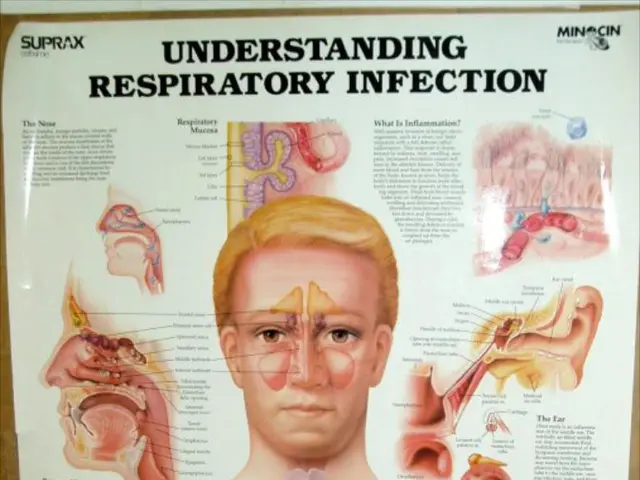Dieting and Depression: A Fresh Look at the Connection
Diets with fewer calories potentially exacerbate depression symptoms.
A recent study led by researchers in Toronto sheds light on the potential impacts of dieting on depression symptoms. The study delves into whether certain diets can negatively affect mental health.
In the United States, a significant percentage of adults struggle with overweight and obesity, and many try various methods to shed pounds. These techniques range from diet modification to medications. However, it's crucial to address the potential pitfalls of extreme dieting, such as calorie or nutrient restriction.
The study, published in BMJ Nutrition Prevention & Health, found that participants who restricted calories were more likely to report higher levels of depressive symptoms.
Unraveling the Link Between Diet and Mental Health
Depression is a common affliction that affects millions each year, with U.S. case numbers on the rise. In 2020, 18.4% of adults in the U.S. reported receiving a depression diagnosis.
Research suggests that consuming healthy foods can bolster mental health, while processed foods can take a toll on it. However, the researchers responsible for this study point out a dearth of information regarding the effects of calorie and nutrient restriction on mental health. They sought to address this gap with their research.
Using data from 28,525 adults who participated in both the National Health and Nutrition Examination Survey and Patient Health Questionnaire-9, the study categorized participants into four groups:
- Calorie-restricted diet
- Nutrient-restricted diet
- Established medical dietary patterns (e.g., the DASH diet)
- No diet
The researchers compared participants' responses to the Patient Health Questionnaire-9 and factors such as body mass index (BMI) and biological sex.
Dieting and Depressive Symptoms: A Closer Look
The study revealed a correlation between the diet category the participants were in and their depressive symptoms. Overall, 7.79% of the participants reported depressive symptoms.
Participants in the calorie-restriction group displayed higher overall Patient Health Questionnaire-9 scores, exhibiting an increase of 0.29 points compared to other groups. This increase was more pronounced in those with higher BMIs in the calorie-restriction group, whose PHQ-9 score was 0.46 points higher on average.
Overweight participants in the nutrient-restriction group did not demonstrate a higher PHQ-9 score overall. However, when looking at just overweight individuals in this group, they displayed a higher PHQ-9 of 0.61 points.
Sex Differences in Diet and Depression
The researchers also noticed some associations based on participants' biological sex. They found that "in biological men, all three dietary patterns were associated with higher somatic symptom scores." Men who followed nutrient-restricted diets were also more likely to exhibit increased cognitive-affective symptoms.
Calorie Restriction and Mental Health: A Closer Look
Amy Roethler, RDN, LD, a dietitian and nutritionist from Newport Healthcare's PrairieCare program, shared her insights on the study with Medical News Today.
Roethler explained that research suggests that significant calorie restriction can lead to negative impacts on one's mental health, particularly depressive symptoms. The study findings provide additional support for this proposition.
According to Roethler, patients she works with tend to focus more on restricting their calories rather than their nutrient intake. This emphasis on calorie restriction is likely why depressive symptoms develop in such cases.
Understanding the Connection Between Calorie Restriction and Mental Health
Timothy Frie, MS, CNE, a neuronutritionist and nutritional psychology researcher, also offered his input on the study. Frie stated that calorie restriction can sometimes lead individuals to omit essential foods required for mood regulation, such as B vitamins, iron, omega-3 fatty acids, and complex carbohydrates.
In conclusion, the study authors plan to research specific nutritional deficits that may arise during dieting and their impact on depressive symptoms.
References:1. Tapper, H., Henehan, C., Lowe, J., Burnet, A., & O'Shea, D. (2016). Diet and depression. The Lancet Psychiatry.2. Jacka, F. N., O'Neil, A., Opie, R., Itsiopoulos, C., Cotter, D., Mohebbi, M., ... & Pasco, J. A. (2010). The effect of a dietary intervention on symptoms of depression in overweight and obese adults with depressive symptoms: a randomised controlled trial. BMJ, 341, c5582. doi.org/10.1136/bmj.c55823. Lin, P. Y., Wang, M. C., Lin, P. T., Lin, P. Y., Lin, H. H., Chang, L. L., ... & Chang, C. Y. (2015). The association between dietary patterns and depressive symptoms in adults. International Journal of Environmental Research and Public Health, 12(5), 5275-5285. doi.org/10.3390/ijerph1205052754. Jacka, F. N., Dawson, D., Mills, D. R., & Berk, M. (2010). A meta-analysis of preclinical and clinical studies examining the effect of probiotics on anxiety and depression. Gut Pathogens, 2, 1-14. doi.org/10.1186/1757-4749-2-55. Liu, L., Wu, Y., & Chen, X. L. (2015). Meta-analysis of omega-3 polyunsaturated fatty acids supplementation on depressive symptoms among major depressive disorder. Neuropsycho pharmacology: official publication of the American College of Neuropsychopharmacology, 40(1), 234-243. doi.org/10.1038/npp.2014.131
- The recent study published in BMJ Nutrition Prevention & Health explores the potential negative effects of calorie restriction on mental health, particularly depressive symptoms.
- The study found that participants who restricted calories were more likely to report higher levels of depressive symptoms compared to other groups.
- Research suggests that consuming healthy foods, rich in essential nutrients, bolsters mental health, while processed foods can have a detrimental impact.
- Amy Roethler, a dietitian and nutritionist, explains that significant calorie restriction can lead to negative impacts on mental health, particularly depressive symptoms, and the study findings provide additional support for this proposition.
- Timothy Frie, a neuronutritionist, suggests that calorie restriction can sometimes lead individuals to omit essential foods required for mood regulation, such as B vitamins, iron, omega-3 fatty acids, and complex carbohydrates, which may contribute to depressive symptoms.








